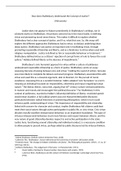How does Shaftesbury Understand the Concept of Justice?
(940 words)
Justice does not appear to feature prominently in Shaftesbury’s writings, nor in
scholarly works on Shaftesbury. His primary concerns lay in the moral realm, in defining
virtue and pioneering moral sense theory. This makes it difficult to explore whether
Shaftesbury had a clear concept of justice, and if so, what that was. So, this essay will
explore the different approaches Shaftesbury had to virtue, to deduce underlying ideas
about justice. Shaftesbury saw justice as important only in facilitating virtue, through
promoting responsible citizenship and liberty, and as a hindrance to virtue when used with
religious manipulation. Justice is defined as fair or reasonable behaviour or treatment. 1
Shaftesbury defined virtue as a citizens’ rejection of corrupt forms of rule to favour the rural
sphere.2 Hobbes defined liberty as the absence of impediments.3
Shaftesbury’s civic humanist approach to virtue within a culture of politeness
underpinned responsible citizenship as a form of justice. Shaftesbury wrote an essay
assessing Hercules choosing between vice and virtue.4 Holding the sword of action, Hercules
was more likely to complete his labours and enact progress. Shaftesbury associated this with
virtue and used this as a classical argument, akin to Stoicism, for the pursuit of moral
excellence. Assessing this as a socialist historian, Solkin adapted ‘civic humanism’ as a term
meaning an individual focussed on responsibility, citizenship and reason regarding human
nature.5 The liberal, Kleine, concurred, arguing that 18th century culture stressed politeness
in manner and morals and encouraged free political discourse. 6 For Shaftesbury in this
context of politeness, married to Hobbe’s influential definition of liberty, restricted speech
would mean injustice. A fair judicial system was one that permitted polite discourse,
particularly between radical historians or pioneering philosophers, which in turn could
enhance public understanding of virtue. This importance of responsibility and citizenship
linked with concern for character and conduct, implies Shaftesbury felt citizens could best
meet their social nature through active participation in public life, or civic virtue. Civic virtue
dictates morally excellent interpersonal behaviour as an imperative foundation. This type of
virtuous interpersonal behaviour must mean fairness and respect between citizens, and the
very nature of good citizenship denotes respect to and active participation in the state.
Justice here, functioning around citizenship and individual conduct, is a necessary condition
to allow people to pursuit virtue, perhaps aided by public discourse led by virtuous thinkers.
1
Oxford Dictionary, (Oxford: Oxford University Press, 2018).
2
Catherine Tite, ‘Shaftesbury’, lecture delivered at the University of Leicester (18 October 2018).
3
Frederick Hood, ‘The Change in Hobbes's Definition of Liberty’, The Philosophical Quarterly (1950-), 17, no. 67
(1967) pp.150-63.
4
Anthony Shaftesbury, ‘The Judgement of Hercules’, in Characteristics (1711).
5
David Solkin, Painting for Money (London: New Haven and London, 1993).
6
Lawrence Klein, Shaftesbury and the Culture of Politeness (Cambridge: Cambridge University Press,
1994).




